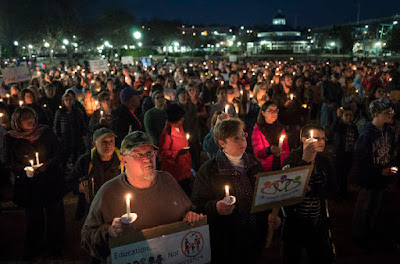 |
| Houses on the hillside in Port-au-Prince |
You can't go to someplace like Haiti without having so many thoughts and ideas to take away from the experience. Here are a few of mine.
 |
| Another view of Port-au-Prince |
1. Haiti is complicated.
Haiti is a devastatingly poor country and has been for hundreds of years. Though billions of dollars of aid have flowed to Haiti, the people continue to languish in poverty. There are several reasons. Big families are looked upon as important in many parts of this country and the simple fact is that there are too many people for the environment to sustain. Also, the fact that they have had so many corrupt leaders in their government has lead to a very small elite class and a very large percentage of people in extreme poverty.
 |
| Roadside stand selling souvenirs |
2 Lives are impacted by a tremendous lack of resources.
In the village we worked in we saw people struggling with a subsistence level of living. Tremendous effort has to be put into growing crops, getting and cooking daily food, and getting to and from the places you need to go. In the clinic, many of the prescriptions we dispensed to people were for everyday medications that are so readily available to us in the U.S. These were things like tylenol, Tums, Claritin, and eye drops. Without the clinic, people in this area can't get simple relief from headaches or heartburn.
 |
| Tilling the soil |
3. Having access to resources has made a tremendous difference in the village.
We saw very few cases of malnutrition in the clinic. That is partly because so many of the children attend school and are able to have access to a healthy meal at lunch. As I have been working on the mobile pack for Feed My Starving Children, it was really interesting to see the impact that a healthy meal can have on the entire population.
 |
| The lunch served at the school |
4. White privilege is striking.
I found myself in a culture where my white skin put me a pretty small minority, but everywhere around me I saw the privileges that were afforded me because of my color and my nationality. I had access to the nicest accommodations and services anywhere I went. One of the friends I traveled with told me that last year they went to a nice grocery store which had armed guards outside to determine who would be allowed to enter.
5. Do everything with great love.
I tried to keep this thought at the forefront of my mind the whole time I was there. Without love, anything I do is wasted effort. I often thought of the way Jesus interacted with the crowds that came to him for healing and felt privileged to be a part of His touching those who come to Him. I tried to look in their faces and see Jesus ("Whatever you do the least of these, you do to me.").
 |
| Dr. Mark showing great love |
6. Put your drop in the bucket.
It is easy to go to a place like Haiti and think, "What difference can this small thing I am doing make?' Nothing ever seems to change. But we were told to just come and put our drop in the bucket and do what we can do, and leave the rest to God. He will multiply our efforts as He sees fit.























